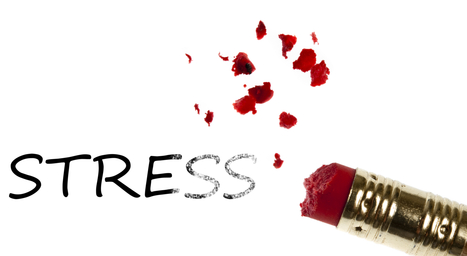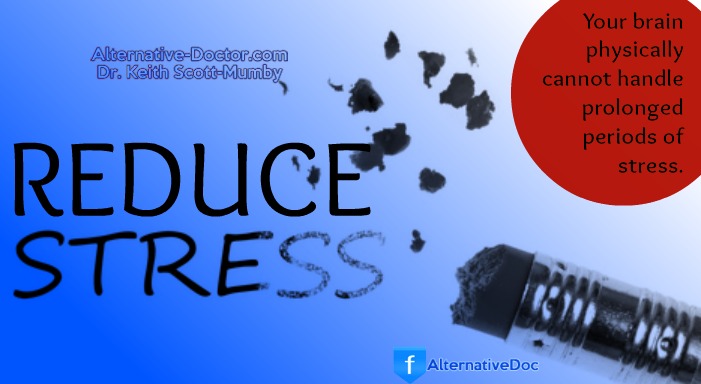Are there easy ways to reduce stress and anxiety naturally?
Tense moments such as paying bills or looming work deadlines will trigger several stress hormones in the body, which cause muscle tension, sweating, increase in heart rate and, increased respiration.
Stress is a silent killer and puts you at risk for chronic diseases, obesity, and insomnia.
I am sure you feel the hectic pace of everyday life wearing and tugging on you and you aren’t alone…did you know that worldwide nearly 500 million people suffer from stress? It’s shocking yet true.
Mental and emotional stress can even cause chronic muscle pain and depression. What mimics a crippling disease is actually an emotional state that is programmed by basic instincts.
This Is Your Brain on Stress
Your brain physically cannot handle prolonged periods of stress. Here is what happens to the brain when you are under extreme stress:
- The physiological stress response begins due to the sympathetic nervous activity.
- Visual and auditory signals are sent to the emotional processing center of the brain call the amygdala. The amygdala then sends a distress signal to the hypothalamus.
- The lateral hypothalamus is the circuit in the brain the controls bad behaviors such as overeating and drinking too much alcohol.
- When these circuits are affected, by stress this influences our coping mechanisms and leads us to engage in these behaviors as a way to cope with stress.
The hypothalamus is the control center for involuntary activities in the body such breathing and heart rate.
The hypothalamus carries out the stress response by increasing heart rate, dilating blood vessels, and, increasing respiration and blood pressure.
The sympathetic nervous response is often referred to as the “fight or flight” response.
This is because it is used as a survival mechanism in the animal kingdom. It is a preparation technique that allows humans and other mammals to face life threatening situations by fighting or running away.
The human body has evolved to activate the stress response in non-life threatening situations however. Family arguments, financial struggles and job stress can all activate the flight or fight response. 
Even though this original mechanism was designed to keep us alive, chronic stress can be very harmful to physical and psychological health.
Prolonged stress contributes to high blood pressure, formation of artery clogging deposits, and changes in the brain that may cause depression and anxiety.
Stress can increase the appetite, decrease ability to sleep and, decrease the motivation to exercise.
It can also cause irritability, migraines, muscle pain, upset stomach and a decrease in sex drive.
Stress has a detrimental effect on the equilibrium of all the body systems which can lead to severe health issues.
Scientific Ways to Reduce Stress Starting Today
Learning how to eliminate and deal with stress on a daily basis could be one of the healthiest lifestyle changes you can make.

Here are a few simple ways to reduce stress:
- Physical Activity: Physical activity benefits the body in several ways. Regular exercise improves immune function, reduces migraines, improves sleep, decreases blood pressure and improves fat metabolism.It also deepens breathing and reduces muscle tension which provides a quick anecdote for stress.Exercise also increases the release of a hormone called in endorphins. Endorphins reduce the negative effects of stress, reduce appetite and make you feel great. You’ve probably heard of the term “runner’s high?” Well endorphins are the feeling of euphoria behind this term. Swimming, biking, running, dancing, walking, and other several other activities can give you the same endorphin boost and provide stress relief.
- Yoga/Meditation/Tai chi: These ancient exercises combine movement with controlled deep breathing which reduces tension in the body. This type of breathing and moving stimulates the relaxation response within the body, which combats the stress response.
- Connecting with family and friends: This seems like an obvious suggestion but the stress relieving benefits of social support are more effective than any other stress therapy. Spending time with your loved ones is a proven and effective way to reduce stress.
A hypothesis called the buffering theory suggests people who have close relationships with family and friends receive emotional support that indirectly helps them face stress and crisis.
- Enjoy a cup of tea: Being British I love my Earl Grey tea. But, I also love green tea. Green tea has many health benefits but even black tea has stress relieving benefits.In a recent study, scientists at University College London noted that people who drank black tea four times a day for six weeks had lower levels of cortisol after a stressful task than those who drank a caffeinated fruit beverage.Green tea contains an amino acid known as gamma-ethylamino-L-glutamic acid, commonly known as L-theanine. One of the unique properties of L-theanine is its ability to induce relaxation response within the brain.Start the kettle boiling and make a pot of your favorite tea for an easy way to reduce stress.
- Magnesium: Magnesium is an effective and safe muscle relaxant for tense muscles caused by a stress. It also can be used as a sleep aid.Magnesium will lower blood pressure boosted by stress and anxiety. Larger doses will relieve constipation as well. Aim for 200 mg dose of magnesium citrate twice daily with food. Consult your doctor before beginning any supplement regimen.
- Fish oil: The omega-3 fatty acids in fish oil have been shown to lower blood cholesterol. They may also blunt the effect mental stress has on the body. Omega-3 fatty acids may help keep the heart rate and sympathetic nerve activity consistent during stressful periods.Omega-3 fatty acids can be consumed from fish oil, olive oil or supplements.
Don’t wait another day to practice at least one of these natural ways to reduce stress in your daily life. All it requires is taking five minutes today to start investing in your well-being.
